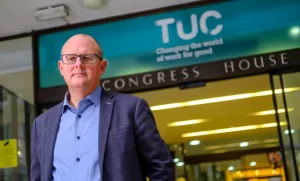
The new leader of the TUC has called for an urgent meeting with the prime minister in an attempt to end the strikes causing widespread disruption to rail travel, the NHS and other public services.
Paul Nowak, who took up the role of general secretary of the TUC on 29 December, said frontline workers needed a “fair deal” and called on the government to change tack by opening pay negotiations with unions.
Nowak’s plea to Rishi Sunak came after another day of industrial action on the railways, as the return to work after the Christmas holidays was severely disrupted by a fresh round of strikes.
In a letter to Sunak, Nowak described public services as being in crisis after years of “underfunding and understaffing”, prompting experienced but demoralised public sector workers in sectors including schools and hospitals to consider quitting.
He wrote: “We can’t solve these problems without a fair deal for the people on the frontline.
“That means talking in an open and constructive way about improving public sector pay. But so far your ministers have refused to negotiate directly about pay with unions.”
In his first week in the job, Nowak called on Sunak to take the “mature approach” seen during the pandemic, when the then-chancellor worked closely with unions to create the furlough scheme and protect millions of jobs.
He added “there can be no resolution” to industrial disputes without ministers getting around the table with union leaders to discuss ways to boost workers’ pay.
“We want to find a resolution to the current disputes so our public service staff can get on with doing the jobs they love. And so our public services can start to improve for everyone who relies on them.”
The beginning of fresh 48-hour strike by railway workers belonging to the Rail, Maritime and Transport union on Tuesday heralded the start of five consecutive days of national industrial action.
More industrial action is planned later in the month by workers in the transport sector, along with those in the NHS and the civil service.
About 40,000 RMT members at Network Rail and 14 train operating companies are striking for two 48-hour periods, from Tuesday to Wednesday, and again from Friday.
Rail passengers have been advised to only try to travel if necessary, as the RMT strike will close much of Britain’s rail network, leaving only a skeleton service for commuters on urban and intercity lines.
Network Rail predicted that only about 20% of trains would run on strike days, while scheduled hours of operation have been reduced to between 7.30am and 6.30pm.
Among the RMT members taking part in the strike are signalling staff, meaning that much of the railway in Wales, Scotland and less populous parts of England will not run at all. Meanwhile, major routes are only likely to have one train operating an hour.
On Thursday, the day between the two RMT strikes, train drivers in the Aslef union will also take action for 24 hours. The drivers’ strike promises even more disruption, and there will be no trains at all across some of the 15 affected operators, including Southeastern, Thameslink, Avanti and TransPennine Express.
Despite the week of action by railway workers, Downing Street expressed optimism that a solution could be found, after Network Rail’s chief negotiator said he believed a deal was “in touching distance”.
Fresh talks over the dispute were expected to take place this week, a No 10 source said.
While there were still outstanding issues, the strike on the railways was viewed as the public sector dispute most likely to be resolved first, the source added.
However, the government still does not have a timetable for releasing more details about its plans to pass a law to make public sector strikes more difficult, such as by imposing statutory minimum service standards for railways.
Earlier on Tuesday, Tim Shoveller, the chief negotiator at Network Rail, suggested the pay offer for rail staff would not be improved, but said better communication about the deal would begin to win over union members.
Shoveller said: “We only need 2,000 people who voted no last time to change their vote and the deal will pass.” He told BBC Radio 4’s Today programme that more RMT members were returning to their roles, but said this was “not the way to resolve the problem or the dispute”.
However, the leader of the RMT reaffirmed the union’s commitment to strike action, unless it received a reasonable pay offer, warning that it had a mandate for industrial action lasting until May.
Speaking from a picket line at London’s Euston station, Mick Lynch, the RMT general secretary, also blamed the government for blocking a settlement, saying there was “an unprecedented level of ministerial interference”.
The transport secretary, Mark Harper, denied that the government had blocked any path to a settlement. Harper told Sky News: “There is a fair and reasonable pay offer on the table. There is not a bottomless pit of taxpayers’ money here.”
Read more:
New TUC leader calls for meeting with Rishi Sunak over strikes




